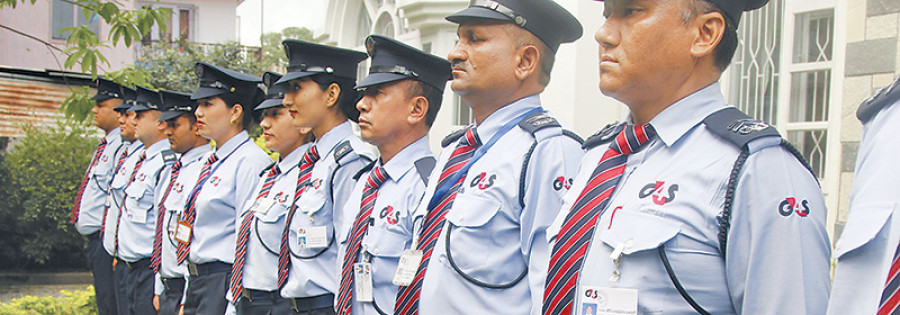Money
Private security companies take a hit as pandemic impacts their clients’ businesses
Not only hotels but also banks and other financial institutions have been cutting down on outsourced security staff, according to the security industry.
Krishana Prasain
With many companies severely impacted by the Covid-19 pandemic and therefore minimising their operating costs, private security guard service providers have taken a massive hit.
The industry estimates that even after the lockdown was lifted on July 21 and many businesses started operating as normal as before, outsourcing of security guards by them dropped by more than 20 percent. That leaves around 30,000 people out of jobs, based on the estimate that there are 150,000 people involved in the private security guard industry in Kathmandu Valley alone.
According to security guard outsourcing companies, it is mostly the hotel industry that has reduced the number of guards, followed by the recreation industry and banks and financial institutions.
G4S Nepal and Garud Securities, Nepal’s two major private security guard companies, have laid off 700 and 600 security guards, respectively.
Abhishek Bahadur Karki, head of administration of Garud Securities, said that security guards working as frontline workers have been infected by the coronavirus which has increased the complexity of arranging staff as well as ensuring the safety of the security guards.
What is worse for security companies is also the fact that companies that avail of their services are not making payments on time.
According to Mahesh Shrestha, managing director of G4S, a multinational security service providing company, with the service taking companies not making payment on time, G4S overhead cost and other financial liability have increased.
“The business turnover has dropped 30 percent compared to what we used to generate in a normal situation,” he said.
Karki also said that all security guard outsourcing companies have been facing cash flow problems which is likely to persist until the economy is back on track.
“The service taking companies are either delaying or holding the payment,” he added. “Our turnover has declined by 15 percent.”
According to Karki, they have not been affected as much as their major clients are multinationals companies, diplomatic agencies and embassies, which have not defaulted payments.
“However, some big hotels, which were also the major hiring sectors, have been shut down,” Karki said.
In Kathmandu Valley, five-star hotels like Hotel Annapurna and Hotel Malla are still closed.
Nepal imposed a complete lockdown on March 24 resulting in almost all hotels, travel and trekking industry to shut down completely.
Although other business houses started operation after July 21, the hospitality and tourism sector started partial operation only from 17 October last year.
With the increasing business and economic activities, the demand for private security guards was rising in Nepal before the pandemic, with the tourism sector, residential housing colonies and apartments, foreign diplomatic missions and development agencies, banks and financial sectors, cinema halls, shopping malls, different mass events deploying private security personnel.
“With the slowdown in the economy and lockdown, service taking companies have become unable to make payments on time or have stopped availing the services and as a result, we had to take loans to make pay salaries for the staff and other expenses,” Shrestha said. “The company’s growth went negative as the income and profit declined.”
If they have not stopped taking the service, they have been reducing the number of hours instead, he said.
This has resulted in cutting off the overtime for the workers in order not to lay off workers.
“But as service hours have declined, payments have also gone down as they are made on an hourly basis,” he told the Post. “Surviving in the capital city with reduced payment is hard and therefore more than 700 workers have quit during the pandemic period so far.”
According to industry insiders, there are around 1,300 registered security companies in the country but only around 300 operating are thinking of renewing their licenses as most companies’ balance sheets have gone negative.
G4S was employing around 5,000 workers before the pandemic and now the company has around 4,000 workers. The new hiring has declined by 50 percent compared to the pre-pandemic situation, the company said.
Security guards who work as frontline workers as they are in direct contact with the public, need priority to be inoculated, Shrestha said.
According to Shrestha, in the case of G4S operating in other nations like Singapore, they were provided financial relief in the form of salaries for the staff during the lockdown period due to which the companies did not face financial trouble as losses were borne by the government.
“But we have been providing salary to staff by taking loans from the bank as there is no government subsidy,” he said.
Karki said that if the government supports sectors like tourism and the manufacturing industry, it will automatically help revive the security guard business.
The government also can support the private security companies and create jobs by deploying the workers in government offices in ministries, departments, corporations, Shrestha said.
“But the nation’s policy is indifferent to companies that provide security,” Shrestha said.
Karki said that the company is looking for business opportunities outside the Valley as new projects like airports, factories and other economic activities have been gradually increasing in other parts of the country.




 8.54°C Kathmandu
8.54°C Kathmandu














